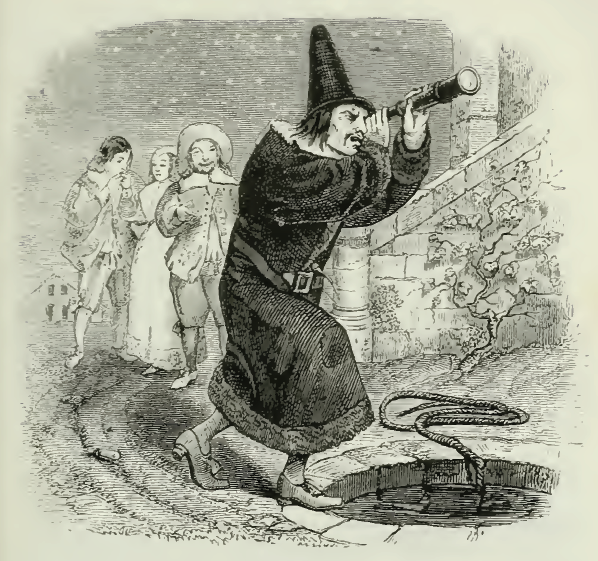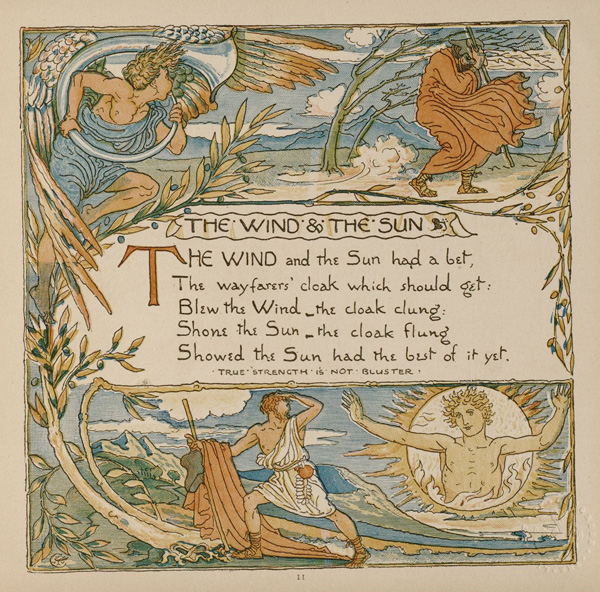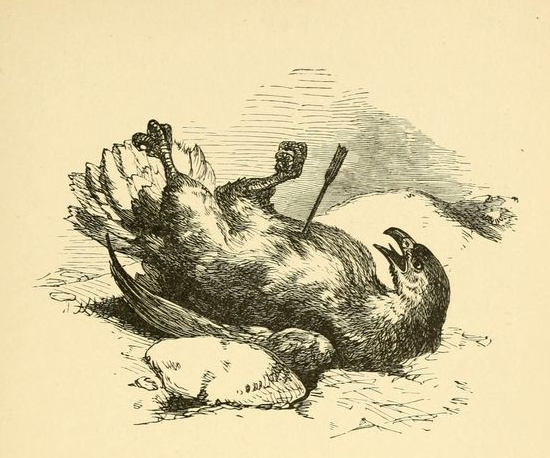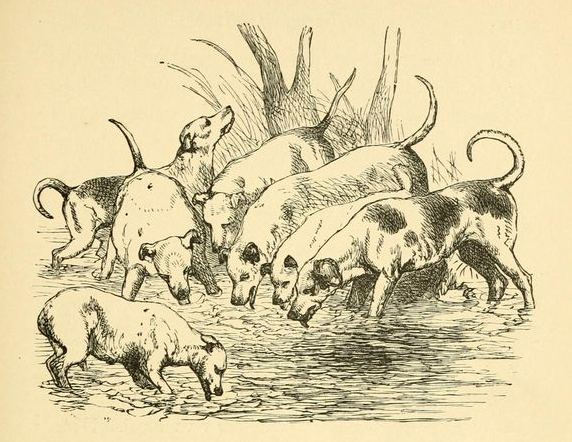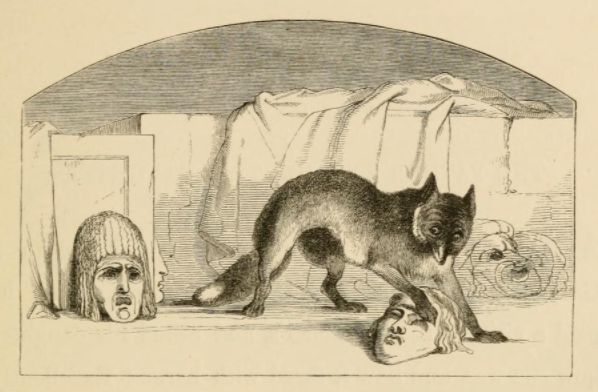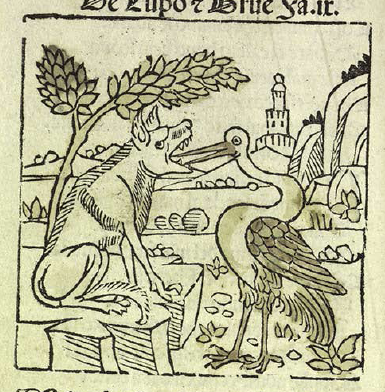The fables below come from Bryce's
First Greek Reader, while the joke comes from Abbott's
Easy Greek Reader, both of which are available at the Internet Archive. (This is the last of the jokes from Abbott; I hope I can find another reader that has more of these jokes!)
You'll find the fables and joke below, first in Greek, then segmented, and then interwoven with English. The titles are linked to the Internet Archive page.
Ἀλώπηξ εἰς οἰκίαν ἐλθοῦσα ὑποκριτοῦ καὶ ἕκαστα τῶν αὐτοῦ σκευῶν διερευνωμένη, εὗρε καὶ κεφαλὴν μορμολυκείου εὐφυῶς κατεσκευασμένην, ἣν καὶ ἀναλαβοῦσα ταῖς χερσὶν ἔφη· Ὢ οἵα κεφαλή, καὶ ἔγκεφαλον οὐκ ἔχει.
Ἀλώπηξ εἰς οἰκίαν ἐλθοῦσα ὑποκριτοῦ
καὶ ἕκαστα τῶν αὐτοῦ σκευῶν διερευνωμένη,
εὗρε καὶ κεφαλὴν μορμολυκείου
εὐφυῶς κατεσκευασμένην,
ἣν καὶ ἀναλαβοῦσα ταῖς χερσὶν ἔφη·
Ὢ οἵα κεφαλή,
καὶ ἔγκεφαλον οὐκ ἔχει.
Ἀλώπηξ ἐλθοῦσα ... A fox went into
εἰς οἰκίαν ὑποκριτοῦ ... the house of an actor
καὶ διερευνωμένη ... and examined
ἕκαστα τῶν αὐτοῦ σκευῶν ... all of his goods;
εὗρε καὶ ... the fox also found
κεφαλὴν μορμολυκείου ... a comic mask,
εὐφυῶς κατεσκευασμένην ... beautifully crafted,
ἣν καὶ ἀναλαβοῦσα ... which she picked up
ταῖς χερσὶν ... in her paws
ἔφη ... and said,
Ὢ οἵα κεφαλή ... Oh, such a head!
καὶ ἔγκεφαλον οὐκ ἔχει ... Yet it has no brains.
Λύκου λαιμῷ ὀστέον ἐπεπήγει· ὁ δὲ γεράνῳ μισθὸν παρέξειν εἶπεν, εἰ τὴν κεφαλὴν αὑτῆς ἐπιβαλοῦσα τὸ ὀστοῦν ἐκ τοῦ λαιμοῦ αὐτοῦ ἐκβάλοι· ἡ δ’ τοῦτ' ἐκβαλοῦσα, δολιχόδειρος οὖσα, τὸν μισθὸν ἐπεζήτει ὅστις γελάσας, καὶ τοὺς ὀδόντας θήξας, Ἀρκεῖ σοι μισθός, ἔφη, τοῦτο καὶ μόνον ὅτι ἐκ λύκου στόματος καὶ ὀδόντων ἐξεῖλες κάρα σῶον μηδὲν παθοῦσα.
Λύκου λαιμῷ
ὀστέον ἐπεπήγει·
ὁ δὲ
γεράνῳ μισθὸν παρέξειν εἶπεν,
εἰ τὴν κεφαλὴν αὑτῆς ἐπιβαλοῦσα
τὸ ὀστοῦν ἐκ τοῦ λαιμοῦ αὐτοῦ ἐκβάλοι·
ἡ δ’ τοῦτ' ἐκβαλοῦσα,
δολιχόδειρος οὖσα,
τὸν μισθὸν ἐπεζήτει
ὅστις γελάσας,
καὶ τοὺς ὀδόντας θήξας,
Ἀρκεῖ σοι μισθός, ἔφη,
τοῦτο καὶ μόνον
ὅτι ἐκ λύκου στόματος καὶ ὀδόντων
ἐξεῖλες κάρα σῶον
μηδὲν παθοῦσα.
ὀστέον ἐπεπήγει ... A bone had gotten stuck
λύκου λαιμῷ ... in the throat of a wolf,
ὁ δὲ γεράνῳ εἶπεν ... and he told a crane
μισθὸν παρέξειν ... that he would pay a reward,
εἰ ἐπιβαλοῦσα ... if she would insert
τὴν κεφαλὴν αὑτῆς ... her head
τὸ ὀστοῦν ἐκβάλοι ... and dislodge the bone
ἐκ τοῦ λαιμοῦ αὐτοῦ ... from his throat.
ἡ δ’ τοῦτ' ἐκβαλοῦσα ... She dislodged it,
δολιχόδειρος οὖσα ... being long-necked,
τὸν μισθὸν ἐπεζήτει ... and requested her reward
ὅστις γελάσας ... but the wolf laughed,
καὶ τοὺς ὀδόντας θήξας ... grinding his teeth,
ἔφη ... and said,
μισθός τοῦτο ... This reward
καὶ μόνον ... and this alone
ἀρκεῖ σοι .... is enough for you:
ὅτι ἐκ λύκου στόματος ... that from the wolf's mouth
καὶ ὀδόντων ... and teeth
ἐξεῖλες κάρα ... you pulled out your head
σῶον ... safe and sound,
μηδὲν παθοῦσα ... not having suffered harm.
Ὀκνηρῷ υἱῷ ἐκέλευσεν ὃ πατὴρ εἰς τὸν γείτονα ἀπελθεῖν καὶ χρήσασθαι ἀξίνην. ὁ δὲ ἔφη, οὐ δίδωσι. τοῦ δὲ πατρὸς ἐπιμένοντος, ἀπεκρίνατο, ἐγώ εἰμι ὁ γείτων, καὶ ἀξίνην οὐκ ἔχω.
Ὀκνηρῷ υἱῷ
ἐκέλευσεν ὃ πατὴρ
εἰς τὸν γείτονα ἀπελθεῖν
καὶ χρήσασθαι ἀξίνην.
ὁ δὲ ἔφη,
οὐ δίδωσι.
τοῦ δὲ πατρὸς ἐπιμένοντος,
ἀπεκρίνατο,
ἐγώ εἰμι ὁ γείτων,
καὶ ἀξίνην οὐκ ἔχω.
ἐκέλευσεν ὃ πατὴρ ... A father ordered
ὀκνηρῷ υἱῷ ... his lazy son
εἰς τὸν γείτονα ἀπελθεῖν ... to go to the neighbor
καὶ χρήσασθαι ἀξίνην ... and borrow an axe.
ὁ δὲ ἔφη ... The son said,
οὐ δίδωσι ... "No axe to give."
τοῦ δὲ πατρὸς ἐπιμένοντος ... The father persisted,
ἀπεκρίνατο ... and the son replied,
ἐγώ εἰμι ὁ γείτων ... I am your neighbor,
καὶ ἀξίνην οὐκ ἔχω ... And I've got not axe.
And here's a random proverb and a random LOLCat too:




